The analyst with the ‘no guarantees’ mindset: Interview with UM UK CEO Kara Osborne
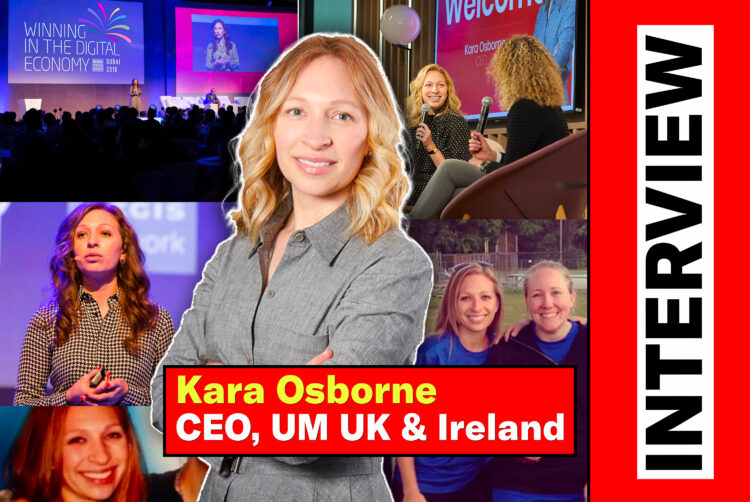
The Media Leader Interview
An analyst at her core, Kara Osborne still carries the scars of early career setbacks. UM’s UK CEO speaks to Omar Oakes about her career and plans for the IPG media agency.
If you think your career has been off to a tough start, talk to Kara Osborne.
After paying her way through university and having already acquired seven years of corporate experience before graduating, UM’s UK and Ireland CEO began her professional life with a double whammy of setbacks.
After securing her “dream job” at Ford, she was made redundant within a year.
Then she got another job at a telecoms company — sure, it was less glamorous, but it was a steady role to make up for a rocky start to full-time work. Until one day…
“I walk in and 50% of the people have been laid off… you feel like your life is ending at that point,” she says.
What kind of professional scarring is inflicted on a young person when they face that kind of double rejection so early in their career?
More than 15 years later, Osborne still carries that memory. She is speaking to The Media Leader during a fine, spring afternoon in London, but the recollection is clearly difficult to summon. At times, her tone is serious and her demeanour guarded, as if being on alert for nasty surprises has become second nature.
“I’ll always carry that insecurity about job and role,” she admits. “[It was] my first big job out of university, it was in a downward recession and so there was no guarantee. That’s partially how I view work in general: nothing is guaranteed. So how am I doing the best thing for my career, the best thing for my employer at any given time, to create that security? Because nothing’s guaranteed.”
The outsider
Osborne isn’t even supposed to be in this position — running a UK major agency — by any recent historical standard.
Agency leaders in the UK are usually usually ex-account handlers or salespeople by training. And they’re not usually American — although Osborne has lived in London for six years and recently gained full UK citizenship.
As a woman, she has typically found herself the minority gender in countless meetings and conference calls. That might be expected in a career that has increasingly bent towards technology, whether it’s creating tech-led solutions for advertisers or navigating chaotic — and, as she would find, morally questionable — start-up life in Silicon Valley.
“It can be difficult to be the only woman in a room,” Osborne says. “The way that women generally think about a challenge can differ than how male colleagues look at it. You can look at that as a barrier or an opportunity.”
Osborne finds herself at the UK and Ireland helm of UM, one of IPG Mediabrands’ three main agencies. She is responsible for about 750 people who plan and buy media for eading advertisers including American Express and General Mills (it will soon also take on media duties for Levi’s, having recently won the fashion brand’s global account).
Since taking charge in November 2023, she has sought to have 30-minute meetings with each member of staff — a 375-hour commitment (at the time of our interview, she has managed “about 85%”).
The “number one” piece of feedback from those meetings, she reports, is that UM staff “love the culture of the company” but want reassurances that they can have “long careers” there.
Given Osborne’s “no guarantee” mindset, what’s her message to them?
“In order to have long careers here, we have to grow as a company,” she responds. “If you want to be here for 10 years, you can’t just kind of ‘win as much as you lose’; you have to have growth.”
Data is a ‘native language’
So, given her background and lack of experience running an agency of this type, what does Osborne think has got her this job?
“My sparkling personality, obviously!” she chuckles with more than a hint of irony. “What I was looking for coincided with a point in time with UM and IPG. As a brand, UM has, for quite a while, looked at how nuances in data can help unlock growth for brands. And because of my analytics and technology background, that comes quite naturally to me. I love that part.”
And she is all about the analytics — even with her hobbies.
Before the days of smart watches and fitness apps, Osborne used to dutifully plan her running training — rest sessions, hardcore sessions, light sessions; goals, milestones — the old-fashioned way: on a spreadsheet. Being an analyst, she explains, data is her “native language… it’s how I think about the world”.
But, as it becomes clear when discussing her ascent to C-suite after a decade at Interpublic rival Dentsu, she is mindful that understanding data and tech is not enough. You have to tell a story that connects with people.
No parties
Osborne’s professional story began at Eastern Michigan University, where she worked “30-plus hours and then trying to taking a full class load”. An odyssey of part-time jobs began at the university’s finance department, then in circulation and marketing roles at USA Today publisher Gannett.
“By the time I graduated university, I had seven years of corporate experience,” Osborne reflects. “I was doing data entry at 18 years old and learning how to go through all financial audits at 20.
“So that type of experience now as a CEO, when I work with my FD [finance director], I understand when they say ‘Hey, we have these requests coming in from finance’ or ‘This is what’s going on with this audit’. I understand how that works because I was in that department.”
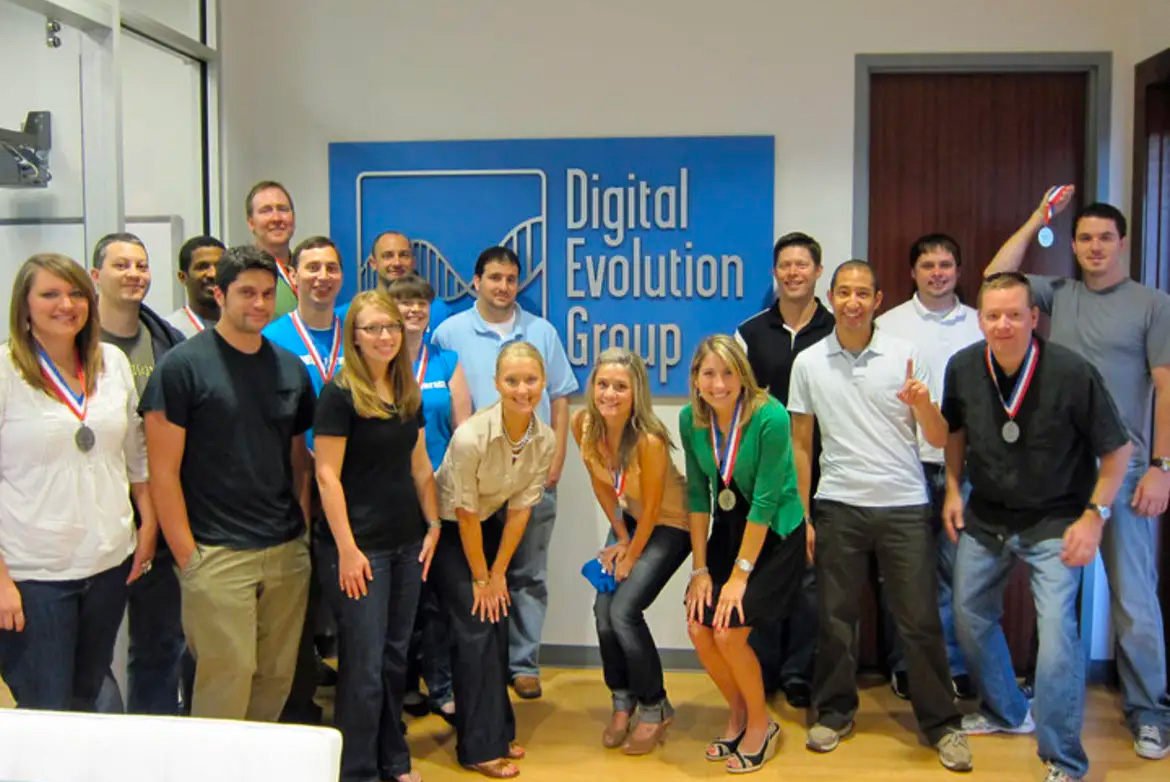
But Osborne soon realised she couldn’t take more than five classes and work 30-plus hours a week, so something had to give. Plus, she was determined not to graduate with a mountain of college debt, as is typical in the US. Today, the average cost for a student living on campus at a public US university is around $100,000 over four years.
That experience gave her the drive to focus on what she really wanted from her career, Osborne insists: “I have sacrificed a lot in order to go to university. OK, then what am I going to do next? How am I going to make that count?“
So, no parties?
“Oh no, none of that. Because it was work and then night school and then doing classes in the summer.”
Her reward was securing her “dream job” at Ford, meaning a move to Kansas from her home in Michigan. There, she learned how the car giant “looks at results and how they think about marketing, and the pressures that marketing departments are under internally”.
Despite the pain of double redundancy that would follow, that stint with Ford would prove instrumental for when her career began to take off as a data analyst for a major car brand.
From Ford to GM at Carat
Dentsu’s Carat had just secured the $3bn General Motors account — a major coup — in 2012. Now based in Detroit, Osborne, having joined Carat as a senior analyst that same year, was tasked with answering a key question that had plagued the maker of Chevrolet and Cadillac. How do you close the gap between the marketing that’s being produced by GM and showing how it impacts sales, when so many car purchases are dependent on the efforts of local dealers?
It also gave Osborne a key lesson in how agencies handle accounts — not being 100% clear on what an agency’s objectives are can cause major problems: “Not having that clarity, I probably made some decisions that, in hindsight, I wouldn’t have.”
As Osborne puts it, her team at Carat were keen to impress the new client and ended up suggesting a media solution (a “cost per action” campaign) that actually saved “too much money” for GM.
“It was so effective that it reset our benchmark with our client for savings target. Instead of saying ‘Alright, you can save this amount of money over the life of the three-year contract’, we saved so much money in the first year that we created a new, ‘too low’ baseline for the next two years.”
So why can’t an agency just explain to the client the downside of adopting benchmarks that are “too low”?
“In that specific situation, we were so new into the relationship. If it was five years in, we probably could have had that conversation. There wasn’t that confidence on either side.”
Trust issues
It raises a deeper question that all media agencies face: the issue of trust.
Since Osborne spoke to The Media Leader, the US Association of National Advertisers (ANA) has launched a major report into what it called “principal-based media” (PM), a growing practice in which agency groups buy inventory wholesale and sell it back to their clients.
It raises fundamental questions about an agency’s long-touted position as an impartial planner and buyer of media channels when it can offer “deals” in various corners of TV and online display.
Critics, such as agency founder and The Media Leader columnist Nick Manning, argue that PM benefits no-one except agencies’ bottom line. The ANA report cited Interpublic, UM’s parent, as among those that trade in PM through its subsidiary Orion.
Osborne insists PM can be applied with a “common sense” approach. Citing “anecdotal” evidence, she says “clients care less about arbitrage than they used to” and today “are looking for ROI” instead.
“There are certain inventory sources that are trusted by a marketplace… and they should always be interrogated — you should be checking it constantly,” she continues. “If you have a rigorous way that you say consistently we know clients like this type of inventory, and over the past five years, people consistently want this type of inventory to show up, it just makes sense to get better deals for your clients and for the agency.”
The tension between what’s best for agencies and what’s best for clients was ultimately the rupture that led to Osborne leaving Dentsu in 2015. Despite having been publicly praised for helping Carat win more business from FMCG giant Procter & Gamble in North America, Osborne became disillusioned.
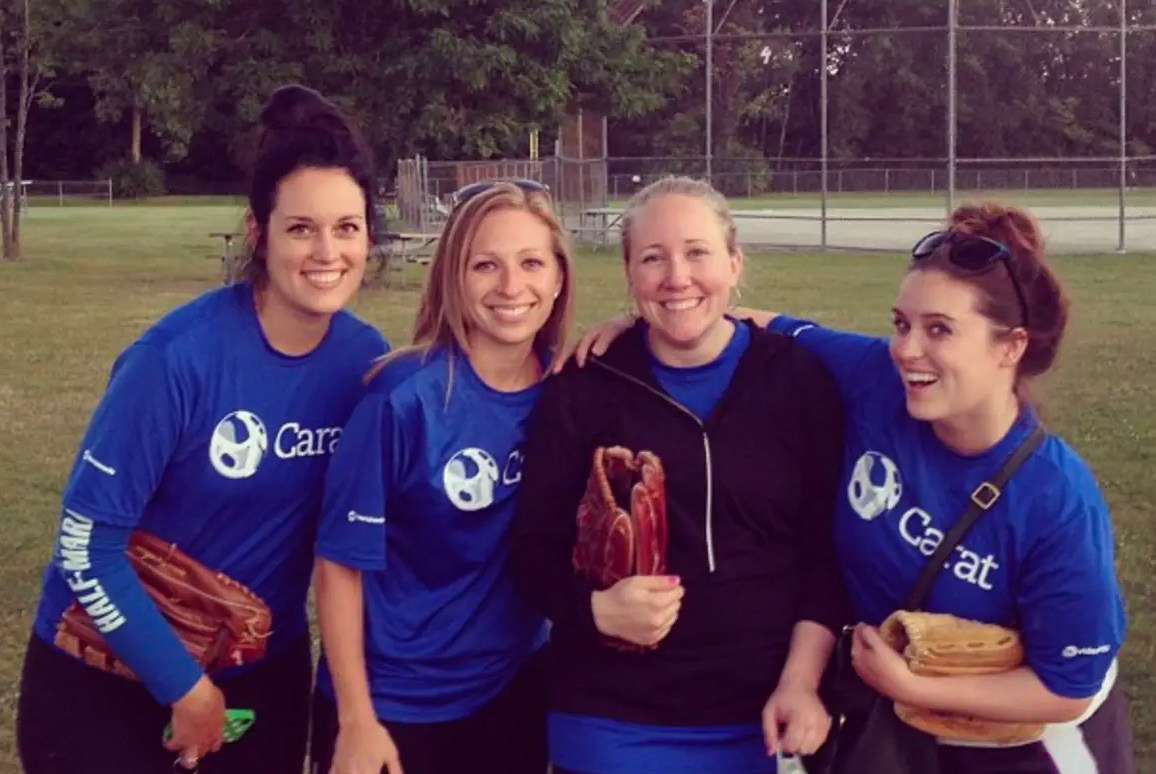
Armed with her analyst training, Osborne could see that a global FMCG advertiser like P&G had a big problem that required a big solution — enabling marketers to use their own data about customers to inform their advertising and marketing strategies.
“All of a sudden, I could see this is a really big problem and we have an opportunity. If we do it right, we could transform the way that we do our business.”
In 2024, this has become more common, with large advertisers employing teams of in-house media specialists who work in partnership with agencies. But nine years ago, the prospect of so-called “in-housing” was mostly considered something to combat, rather than accommodate, by the large agency groups.
And Dentsu was even less likely to be convinced at that time, because it had just made a big investment that needed to start paying back. It was finalising a billion-dollar deal to acquire a majority stake in Merkle, which specialises in personalised advertising, also known as online response advertising or performance marketing.
“[Merkle] are going to solve that” was the direction Osborne was given. After being twice impacted by redundancy as a trainee, Osborne had now hit her first ceiling as a senior manager. Even if your idea has merit, and even if you develop the ability to communicate that idea with data and a good story, it still may not be enough to realise your vision.
So Osborne left. She was done with pitching and working with large advertisers, and eager to try her hand at a start-up, where life can be faster, riskier and perhaps more fun.
A completely different game
What Osborne discovered was certainly fast and risky — as well as ethically challenging.
In the autumn of 2016, she joined as senior director at Machine Zone, a then eight-year-old tech company that had roared to success as a leader in mobile gaming, thanks to the success of Game of War: Fire Age.
“Mobile gaming was completely different than anything else that I had worked for,” Osborne recalls. “But it was fascinating from a data perspective, because at that point in time, you could follow a user journey all the way through, from impression through to purchase in game activity.
“And that was before the California Consumer Privacy Act and GDPR — the amount of data visibility that you could have and the patterns that you could see… it was fascinating. At that point, the company knew that 70% of its revenue was driven by marketing. As opposed to many of our clients today struggling with ‘why is marketing relevant’, Machine Zone were like: ‘Marketing is very, very relevant and it drives our business.’“
Co-founder and CEO Gabriel Leydon had reportedly used fresh venture capital funding in 2012 to “bet everything on Game of War“. It would not be the only time, according to Osborne, that Leydon would engage in high-risk tactics.

“I would say it wasn’t a good culture fit for me personally. From a data analyst geekiness level, it was a wonderful fit — more data than you could imagine. But from a moral standpoint, it wasn’t a great fit. There was lack of responsibility on the technology that we were using.”
In 2015, the year Osborne joined the business, a Machine Zone employee was arrested by the FBI for allegedly downloading data generated by millions of Game of War users, including player spending habits broken down by time, location and age. Such information enabled the company to “make important business [and] engineering decisions”, according to the complaint, as reported by The Wall Street Journal.
Men-tors
Osborne’s career on the tech side of media has, perhaps inevitably, led to forming strong working relationships with men, particularly at Dentsu, where she has spent the majority of her career so far.
Her husband, Christian Gladwell, is a Dentsu veteran. Her best friend is Tom Amies-Cull, formerly global operations officer, media, at Dentsu Aegis Network. Her current boss, IPG Mediabrands UK CEO Richard Morris, knew Osborne well as a fellow Dentsu employee while at Vizeum (now iProspect). Jeremy Cornfeldt (ex-US CEO of iProspect) is also cited as a big source of inspiration.
While Osborne is loath to single out one person, it’s clear that Nigel Morris has had a significant impact as a mentor. The Dentsu veteran, who previously ran ad agency Isobar and the company’s US media business, leaves an indelible mark.
They first met during Carat’s P&G pitch in 2015 at a “data, tools and tech session”. This is commonplace for big media pitches nowadays but a decade ago would be considered a novelty.
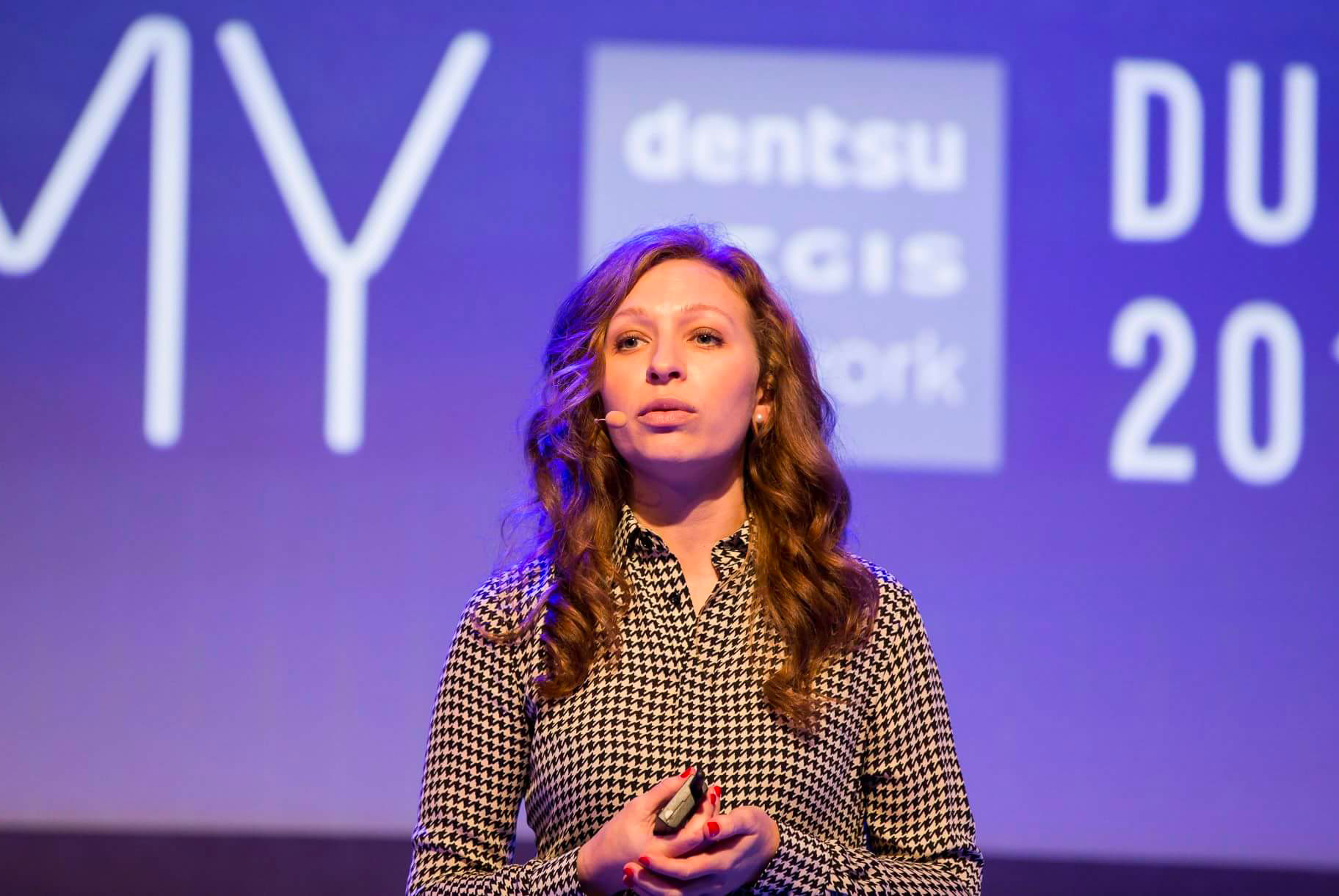
She explained: “That pitch was this pressure cooker of: ‘How can you create a solution to a problem we’ve never heard of?’ For the largest pitch that was happening globally at the time. That was my first pitch that I’d been in a media agency and Nigel was leading it.
“[The pitch] expanded my thinking in a different way… I had this deep expertise around analytics and data. I know how to speak the client’s language pretty well. I also saw agency ambition and opportunity shared with me in a really accessible way. Bringing all those together, it worked and we got on. He really pushed me to think about things differently and come up with different problems.”
In fact, during Osborne’s 18-month tenure in Silicon Valley, the two spoke regularly on the phone. When Osborne decided to quit Machine Zone, Morris had an irresistible offer: come back to Dentsu in a global role as chief product officer, based in London.
Plan for UM: ‘Making a vision accessible’
After listing her mentors, Osborne checks herself and realises something out loud: “I haven’t listed a woman.”
Is that something that bothers her, having a lack of female role models in her career to date?
“I worked in publishing, which is a male-dominated industry; I worked in automotive, a male-dominated industry. And then I’ve worked in data and tech, which is, again, a male-dominated industry. It can be difficult to be the only woman in a room.”
The way Osborne combats that challenge seems to echo the way she handled university — work, work, work.
“Over my career, I’ve often felt like I need to be at 150% of the [level of] other people in the room — because not only do I need to know my stuff, I need to know what they’re doing and then how much what I’m doing connects with them,” she reflects.
“It’s really pushed me to learn more parts of the business, to understand what other people are going through and really tap into empathy about why would someone react a certain way.”
In this respect, UM is a sharp change of pace. The agency has (slightly) more women than men on its books and a majority of women make up its senior leadership team.
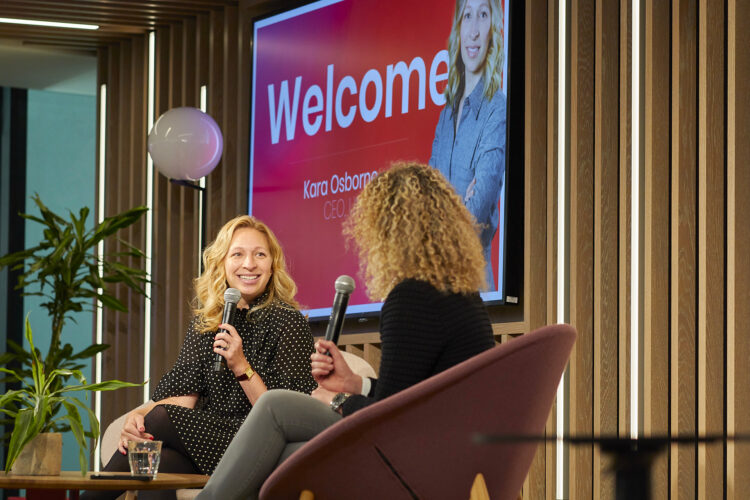
“It’s been fantastic,” she says. “It’s almost put me off kilter, because I’m so used to having to be very strong in my opinions, make sure that my voice is heard. Whereas here, you can just speak as you are. You don’t have to necessarily fight to be heard as much.
“It’s almost an intangible thing of how different it feels to walk in a room and say: ‘Oh, I don’t have to completely change the way that I talk.’ IPG has been doing this for 10-15 years — this idea of diverse teams and women in leadership.”
The more Osborne talks about what drives her and what she wants to achieve, there is no mistaking a passion for detail and, in her words, “making a vision accessible”.
“Part of that comes from being a practitioner — starting out in analytics within media meant that trying to understand how what I did was helping us achieve our goals was really important to [clients],” she continues.
“Many times early on in my career in media, not understanding how what I was doing was driving the overall goal has meant that I probably over-index on trying to ensure people can access that vision and that objective, and making sure that I spend enough time with the team and answering questions — the hard questions and the easy questions alike.”
Is that a fancy way of saying she shares too much?
“We need to treat people as adults,” Osborne insists. Sunlight is the best disinfectant.
Final questions
While Osborne admits “there aren’t many silver bullets out there”, she is clear that it’s the application of media planning and buying with technology that will enable a large media agency like UM to remain relevant in a world where clients are having to understand customer data and have more in-housing options than ever before.
In other words, exactly the challenge Osborne identified in 2015 at Dentsu. Except now she’s a CEO and in a greater position to exert influence. No longer the upstart, no longer the outsider, no longer the minority.
But, again, her sense of pragmatism reveals itself: “If agencies now have more data and technology at their fingertips, how do we think about agencies evolving? How are we equipping our teams? How are we training them? How do we think about using the technology? How do we create data literacy? Those types of questions I’m passionate about.
“And having passion for that and a vision for how employees and tech come together. That’s what I was doing in my last role, just at a functional global level. But then the opportunity, the thing that really excited me about taking this role, was that I could actually drive results on clients. So it’s not just theory. It’s not just ‘use this piece of tech; do this training’, but it’s saying: how do those come together and work on clients’ business?”
If anything, it’s the questions rather than the answers that seem to excite Osborne most — something that speaks to her natural curiosity and background as an analyst.
The other thing about questions is that, by definition, they entail uncertainty. Or in Osborne’s own words, there are “no guarantees”.



